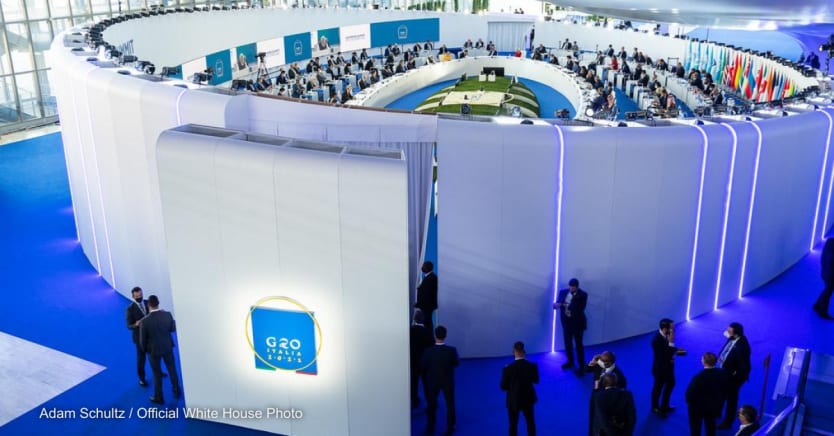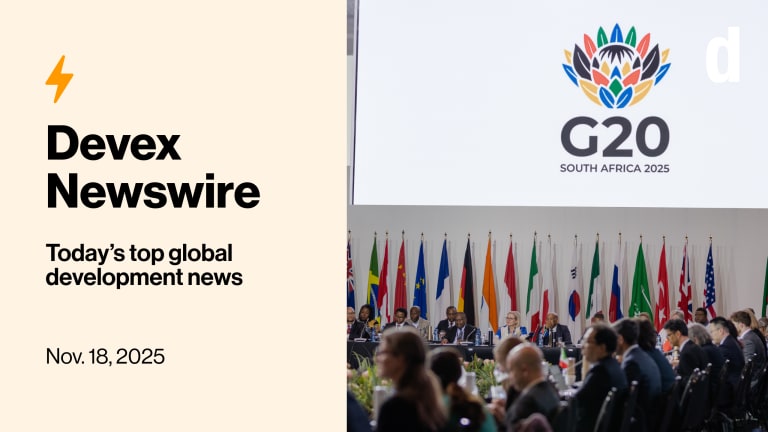
History shows that multilateralism is the surest route to global stability and economic progress. The tragedies of the last century and those now unfolding across the world reflect the dangers and futility of fragmented approaches and win-lose policies. As a national leader, I have seen firsthand the effects on the general public of both the costs of international tensions and the benefits of countries working together.
The summit of the Group of 20 high-income and emerging economies is the world’s main vehicle for collaborative multilateral governance of the world economy. Its general objectives include policy coordination to achieve global economic stability and sustainable growth, reducing risks and preventing crises, and modernizing the international financial architecture.
The G-20’s creation in 1999 reflected a recognition among the Group of Seven countries, in the aftermath of the 1990s emerging market financial crises that insufficient involvement of low- and middle-income countries in deliberations about global economic problems increased risks to world financial stability.
G-20 membership seeks to be broad and representative but manageable in size. Comprising 19 countries plus the European Union, G-20 members represent about 80% of the world's gross domestic product, 75% of world trade, and over 60% of the world’s population.
As the EU has 27 member states — of which France, Germany, and Italy are also individual members of the G-20 — the G-20 effectively represents 43 countries or nearly a quarter of United Nations members. Of all these countries, only one — South Africa — is African. The African Union is occasionally a guest invitee.
The Pro read:
Debt crisis worsens in poor countries, but no sign G-20 in a hurry
The World Bank and IMF's Spring Meetings will coincide with a gathering of G-20 finance ministers this month. But there is a growing worry that even as a debt crisis worsens in low-income countries, leaders will fail to devise a solution.
The G-20 has paid increasing attention to African concerns and global issues relevant to Africa. Most recently, it has sought to help low-income and indebted countries worldwide, including those in Africa, with COVID-19 vaccine coverage and with initiatives like the Debt Service Suspension Initiative and the Common Framework for debt treatments.
In 2021, the Italian G-20 presidency hosted the first virtual Africa Advisory Group meeting. Shortly after, the G-20 endorsed the important decisions taken by the Paris Summit of Financing African Economies organized by France which I co-sponsored. In 2017, the German presidency launched the G-20 Compact with Africa to help promote private investment in Africa, and, in 2016, the Chinese presidency-initiated efforts to support African industrialization.
But Africa is not yet sufficiently involved in G-20 decision-making. South Africa’s inclusion is very welcome and has helped ensure the continent is visible in this important forum. However, the other African countries are not there, which account for 96% of Africa’s population and 85% of its GDP. The African continent is home to 1.4 billion people, a population roughly equivalent to China or India. Combined, the African countries would be the world’s eighth-largest economy.
The G-20 compromises its effectiveness and influence by omitting such a large fraction of humanity and the world economy. The omission constrains Africa’s ability to provide views on major global economic issues at the G-20 summits as well as ministerial and technical meetings.
Instead, Africa is left to absorb decisions made by others, even on issues that affect its countries directly. The most pressing issues — climate change, pandemics, security, and debt — are ones that both affect Africa and on which Africa is in a position to contribute to solutions. Such a gap in African representation can weaken the G-20’s credibility, traction, and representativeness.
Opinion: It's past time to expand IMF’s African department
The divided composition of IMF's African department, and some of the institution's policy interventions, may still reflect traces of the continent’s colonial past.
The G-20 can address this gap by admitting the AU as a member. Several prominent figures have made such a call over the years, and I note the ideas put forward by Jeffrey Sachs and other notable voices in recent months. By adding just one chair, the G-20 would come to represent the views of 54 additional members, the bulk of low-income countries, and about 80% of the world’s population.
The AU’s inclusion would strengthen global economic governance and implementation of G-20-endorsed policies. African countries would have ownership of G-20 decisions on key issues and policy coherence and coordination within Africa would increase.
From a practical point of view, the AU could be represented by the annual chair of the AU and the AU commission chair. Their mandates would be guided by African heads of states’ annual meetings. Countries’ goals would be formulated in regional terms on the basis of Africa’s overarching development plan — Agenda 2063 — of which the African Continental Free Trade Area is a concrete outcome. On issues where views may differ across the continent, ensuring an AU position at the G-20 would help strengthen cohesion and collaboration.
Overall, including the AU in the G-20 is a workable idea whose time has come and that would benefit the G-20, Africa, and the world.
Search for articles
Most Read
- 1
- 2
- 3
- 4
- 5








